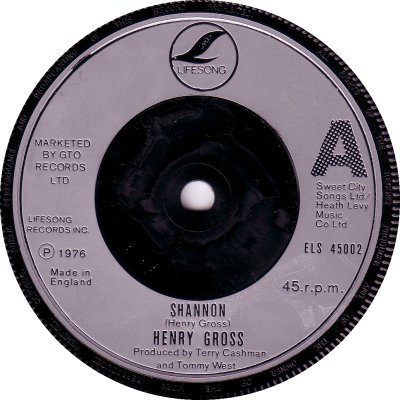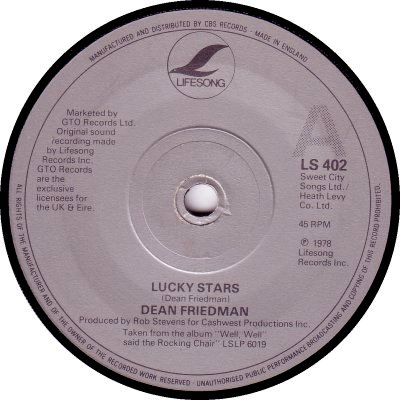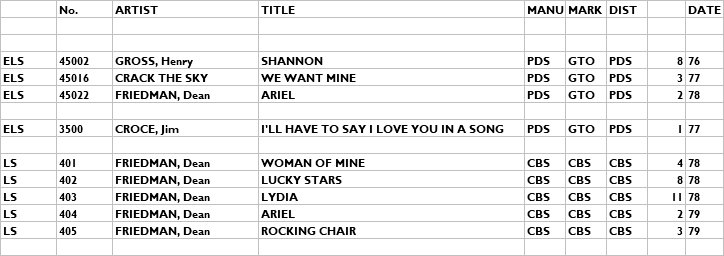

American, based in New York. Lifesong was owned by singers / songwriters / producers Terry Cashman and Tommy West. It was formed after their contract with ABC Records ended, and it was named after one of the albums they had made as a duo. It made its debut in the summer of 1975, as noted in 'Billboard' of the 9th of August. According to 'BB' of the 22nd of October 1977 Lifesong had been formed in order to reissue items from the catalogue of the late Jim Croce, which Cashman and West had produced and which they had purchased from his widow Ingrid, as mentioned in 'BB' of the 12th of February of that year. Unfortunately there had been a dispute with ABC Records, the label on which Croce's records had appeared, and Cashman and West had only recently been able to get the masters from ABC, by means of a court order. In the absence of Croce's material Lifesong managed a decent start, getting three singles by Henry Gross into the Hot 100 in 1976; the most successful of them was 'Shannon', which peaked at #8. The following year Dean Friedman did well with 'Lydia', though it failed to crack the Top 20.
In the autumn of 1977 Lifesong became an associate label of CBS, in part at least to ease financial pressures. For financial reasons, earlier that year Cashman and West had sold the master of Jim Croce's 'Time In A Bottle' album to a group of investors, the Doughbro Record Company, who were leasing it back to them ('BB', 12th February). Reporting on the CBS deal, 'BB' of the 22nd of October quoted the duo as saying that with no big-selling artists and no strong back-catalogue a small independent label had cash flow problems between hits, which led to its becoming more conservative. They said that the link with CBS would enable costs to be cut and would free them to concentrate on their production and A&R roles. Sadly the arrangement with CBS didn't prove to be satisfactory, and 'BB' of the 16th of June 1979 revealed that it had been brought to an end. Cashman and West had reclaimed their masters and intended to function as a production company in the future. West blamed CBS - who he said were 'overburdened with acts' - for not pushing Lifesong's product enough. He and Cashman were trying to negotiate with overseas affiliates directly, placing individual masters, and were making Dean Friedman a priority; he had done well in Britain, and had recently earned a silver disc for 250,000 sales of his 'Lucky Stars' single there ('BB', 19th May 1979). Lifesong continued to issue records in the States until 1988, but from 1983 onwards it was basically a vehicle for Terry Cashman's own releases.
Lifesong first appeared in Britain in 1976, via a licensing deal with GTO Records ('Music Week', 24th July), and it remained with that company. It enjoyed a reasonable amount of success, despite the fact that only a selection of its American issues came out here. Henry Gross (once, with 'Shannon'; 1976) and Dean Friedman (three times, with 'Woman of Mine', 'Lydia', and 'Lucky Stars'; all 1978) took it into the British Singles Charts, which wasn't a bad hit ratio from just nine singles. 'Lucky Stars' b/w 'Company' (LS-402; 9/78) got highest up the charts, reaching No.3. Being licensed to GTO, Lifesong went where GTO went. It started out under the Polydor umbrella, which explains the injection moulded labels of the early singles (1), and moved to CBS when that company bought GTO, in the spring of 1977 ('MW', 14th May). At that point paper labels were adopted (2). Its catalogue numbers changed at the time of the move, from the ELS-45000s (these numbers were those of the corresponding American issues) and ELS-3500s to an LS-400 series. Its final six singles in this country were all by Dean Friedman. The last of them came out in March 1979.



Copyright 2006 Robert Lyons.

